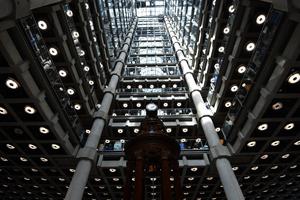 This file photo shows the interior of Lloyd's of London, the centuries-old insurance market, in London on March 30, 2017. (BEN STANSALL / AFP)
This file photo shows the interior of Lloyd's of London, the centuries-old insurance market, in London on March 30, 2017. (BEN STANSALL / AFP)
Lloyd’s of London, the world’s largest insurance exchange, estimates the industry will suffer around US$203 billion in losses from the coronavirus pandemic this year.
The projected losses include about US$107 billion from underwriting claims..The claims costs are on a par with some of the most catastrophic hurricanes of recent years and could rise further if the virus isn’t contained, Lloyd’s said
The projected losses include about US$107 billion from underwriting claims, with the rest from insurers’ investment portfolios, Lloyd’s said in a statement. The claims costs are on a par with some of the most catastrophic hurricanes of recent years and could rise further if the virus isn’t contained, Lloyd’s said.
ALSO READ: China's insurance companies' profit down 14.44% in Q1
“Once the scale and complexity of the social and economic impact of COVID-19 is fully understood, the overall cost to the global insurance non-life industry is likely to be far in excess of those historical events,” Lloyd’s said.
The pandemic, which has infected at least 4.2 million and killed nearly 300,000, has confronted the insurance industry with its biggest challenge to date. While triggering a deluge of claims related to canceled events, business interruption and other costs, the outbreak has threatened a global recession that’s put the payment of many household and business insurance premiums at risk.
ALSO READ: Global cost of coronavirus could reach US$4.1 trillion, ADB says
As economies ground to a halt, many European insurers withdrew earnings guidance and suspended dividends. In the UK, general insurer Hiscox Ltd. was among the first wave of firms to tap public markets for additional capital after coming under pressure to make good on business interruption policies.
Lloyd’s estimates that it will pay out in the range of US$3 billion to US$4.3 billion to global customers, on a similar scale to the Sept. 11 attacks of 2001.
READ MORE: UN: Global economy could shrink by 1% in '20 due to virus
“The thing that is special about this, is it is impairing the asset values as well as creating liabilities,” Chairman Bruce Carnegie-Brown said in an interview.
READ MORE: 'Hidden' defaults set to soar as recession squeezes companies


